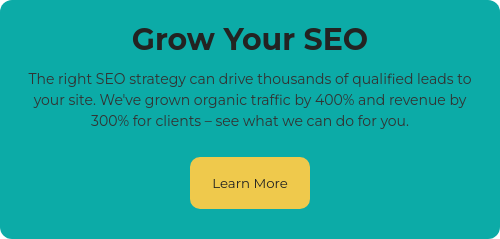If you’ve ever had a discussion about SEO, you’ve definitely heard the terms “backlinks” and “link building.” Over the last decade, link building has remained one of the most effective ways of improving organic search results and driving increased traffic to websites. Remember how spammy the internet was in the early ‘90s? If you wrote a blog, you'd receive dozens to hundreds of comments saying, "Great post! Check out my business LINK." Now, Google has made it nearly impossible to link spam by creating an algorithm that only rewards very specific and strict link strategies. If you want your website to rank, you are forced to create high-quality links and content. Let’s dive a bit deeper.
History of Link Building
In the early ‘90s, Yahoo and AltaVista owned the internet and ranking factors were based on relevancy, keyword density and meta tags. However, come 1998, Google introduced its Pagerank-based algorithm. Ranking websites had never been done before. Users were now able to search and find pages that were accurate to the search based on the number of links pointing to any website. What Google was effectively saying was, "If people are linking to your website content, it is of value and therefore likely to serve the search intent of a user." Google established linking importance and continued to further establish the SEO industry with the power of keyword placement.
Once the new century hit, SEO found a way around Google’s algorithm and started almost “tricking” the system so websites became viewable in top searches whether they were relevant or not. This tactic is termed “Black Hat SEO.” Black hat SEO refers to techniques and strategies used to get higher search rankings, but by doing so, you’re breaking search engine “rules." The onset of Black Hat SEO led to low-quality websites with no value content ranking in Google’s index. Same-source links, directory submission links and press releases (heavily riddled with keywords, brand names, phone numbers, etc.) were popular during this time. Between 2005 - 2009, mass link-building tools were introduced. These automation tools created endless content possibilities, but the content quality was still bad because it was the same content spun in hundreds of variations.
Google pulled the plug on it all, as none of it was adding any real value to their searchers intent. Of course, Google found a way to identify the “extra” content and decreased the benefit of links coming from this content. This is when SEO got the first message that quality and original content is the most valuable strategy, in addition to natural link building through quality content. If you create great content, other websites and brands should naturally link to it. (white hat SEO).
To say Google’s algorithms have changed a lot of the years is an understatement. Since 2010, everything is focused on improving quality and relevancy. Over the last year alone, Google has made over 500 changes to its algorithms. Google has grown in intelligence over the years, making it nearly impossible to get by with any sort of spammy or non-relevant content.
Importance of Backlinks
Backlinks are links that are directed towards your website. The higher the volume of links that are associated with your website indicates the importance or popularity of it and improves your 'website authority.' Another metric that matters is the number of referring domains linking to your website. Instead of having 100 links from one website, you should have 100 links from 90-100 websites. SEOs call linking metrics such as the amount of links you have and the referring domains linking to your website a "backlink profile."
A quality backlink profile is very important for SEO because Google will give more credit to a website that has a higher volume of backlinks and referring domains. The better backlink profile your website has, the more relevant it becomes (over competitors, etc.) in results pages for a keyword search query. The simple idea here is that if two websites are talking about "business credit" and website one has 4,000 backlinks from 3,200 websites and website two has 500 backlinks from 400 websites, website one will be higher on the first page of Google than website two.
SEO tools like AHREFs allow you to look at your backlink profile. You want to do this to continuously improve your rankings. There are eight things to look for and improve on when analyzing your backlink profile:
-
Total number of links
-
Links that Google considers high quality (from websites with a high domain authority)
-
Unique domains linking
-
Page performance
-
Spam score
-
Anchor text usage
-
Relevance
-
Backlink placement
AHREFs also allows you to research your competitors ranking and what you can do to outrank them. Therefore, you can type in a competing website and see their backlink profile. This allows you to see what a gap you have between you and your competitors in terms of total links and other linking metrics. Competitors can stand at two levels; the first being a domain-level competitor, that compete with you in many search terms across many pages. The second being page-level competitors, that are not competing on a site-wide level, but page-level for specific topics and keywords. The tool will help you uncover thousands of potential link opportunities, find your competitors guest blog posts and superfans, spot easily-replicable link opportunities and much more.
Why Link Metrics Matter
It’s important to be knowledgeable on different types of link metrics, such as Page Authority and Domain Authority. These types of metrics will help you answer how strong your page is where you will be creating the link.
According to Moz, Page Authority measures how well a specific page will rank on search engine result pages. The score ranges from one to 100, with the higher scores corresponding to a greater ability to rank.
Domain Authority, according to Moz, also predicts how well a website will rank on search engine result pages on the same score range. However, the difference between domain and page authority is that domain authority measures the predictive ranking strength of the entire domains or subdomains, where Page Authority measures the strength of an individual page.
In regards to either of these metrics, if your score has gone up or down, there are many factors that could influence that movement. For example, your earned links from websites that don’t contribute to Google ranking, or your highest-authority sites experienced a huge increase in link growth, skewing the scaling process.
Ways to Build Links Today
The best way to get more earned links to your website is by creating relevant and useful content people want to link/share themselves. A few ideas include:
-
Infographics
-
Data-driven content (extremely effect for lots of links)
-
Downloadable guides
-
Industry relevant news from your company that media sites and others will write about
-
Guest blogging on popular sites with high domain authority or sites with the same audience as yours
-
Content partnership and partnership marketing
Despite all of the changes Google has made to prevent 'gaming their system' and paying for links, it is still completely acceptable in the SEO and marketing industry to pay for links. Paid links are a bit taboo, and is hardly talked about in the SEO world. Buying or selling links is a violation of Google’s Webmaster Guidelines, and there is a penalty if you get caught. However, most brands are still doing it. Paid links are where you pay a brand to place a link on their site (usually by writing a blog post for them). Through your link strategy, you’ll have to vet whether or not the risk is worth taking.
If you decide to pay for links, they are expensive (usually $400 minimum a link) and require a lot of time and strategy to find the right partner, create content for their website that is natural and useful, and develop a backlink strategy for your business. If you're looking for a white hat partner to help you build paid links, there are also many tools out there to assist in link-building initiatives. We have vetted a few and highly recommend AudienceBloom and Outreach Mama. Outside of those two partners, tread carefully when evaluating link building partners to work with and ensure you don't get caught up in link networks.
Link building is an art and one of the most challenging parts of an SEOs job. However, link building is important (if you haven’t gotten that from this post already)! It absolutely should be a central component of your growth strategy.






